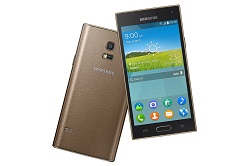Samsung has finally unveiled its first smartphone running on its homegrown mobile operating system, almost six months after it abandoned a planned Russian launch.
The Samsung Z1, released today in India, is the first mobile phone to appear loaded with the manufacturer’s lightweight Tizen OS following its appearance on a number of Samsung wearables last year.
Samsung said Tizen, an open-source platform that licenses some of its elements from Android, offers users a simpler user interface as well as improved device performance.
The OS was originally meant to debut on the Samsung Z smartphone in autumn 2014 before it was delayed indefinitely.
The Z1 features an SOS location function that allows users to send out an alert to their primary contacts and track their location in emergency situations.
Samsung is also launching a free entertainment service called “Joy Box” that will gives users access to film, TV and music content, in addition to offering access to “premium” music and live TV services on Club Samsung.
Technical specificiations of the Z1 include a 1.2GHz dual-core CPU, 768MB RAM, expandable storage and dual-SIM support.
Hyun Chil Hong, President and CEO, Samsung India Electronics, said: “The smartphone market in India is rapidly evolving, with many consumers using their device as their screen of choice for content including videos, television programs and video games, as well as a range of apps.
“We have customised the Samsung Z1 to meet these unique, entertainment-focused needs of local Indian consumers for a personal and reliable mobile experience.”
Last year, the company said it intended to have the platform powering smart televisions, connected cars, wearables and robotics.
Read more:
CES: Samsung calls for IoT partnerships as Qualcomm switches on smart lights
Samsung opens up health, VR and connected home to developers in new SDK deluge



